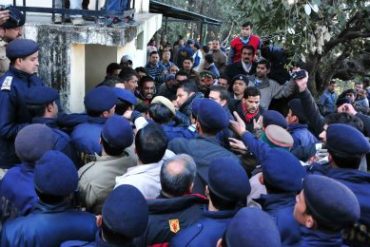New Delhi : Opposition members Tuesday tore into the government’s Lokpal bill, terming it deeply flawed and weak, during a stormy daylong Lok Sabha debate that also saw ruling UPA allies fault the draft legislation. Prime Minister Manmohan Singh urged MPs to rise above party politics and pass the law.
The opposition demanded withdrawal of the Lokpal bill introduced in the house last week, citing “deficiencies”, but the government asserted it should be passed as it reflected the sense of the house passed in the form of a resolution in August.
“I urge my colleagues in parliament to rise to the occasion and look beyond politics to pass this law,” said Manmohan Singh, intervening in the heated debate in the house.
The Lok Sabha discussed the contentious bill even as social activist Anna Hazare and thousands of his supporters gathered at a ground in Mumbai for a three-day hunger strike to force the government to enact his version of the law that he says is key to setting up a strong ombudsman to fight rampant graft in the country.
Parliament is meeting Dec 27-29 in an extended session to debate the proposed law that would be put to vote at the end of the debate.
Opposition parties proposed many amendments to the bill which include giving the Lokpal an investigative wing, setting the Central Bureau of Investigation (CBI) free from the government’s administrative and financial control, and making it optional for states to set up their own anti-graft Lokayuktas.
Bharatiya Janata Party’s (BJP) Sushma Swaraj punched holes in the Lokpal bill, saying it was anything but a strong and effective law to deal with corruption in the country.
Her objections included forcing states to have similar anti-corruption bodies on the lines of the central Lokpal and the selection process of the ombudsman.
“It is patently unconstitutional (bill)… deeply flawed and tampers with the basic structure of our constitution,” Sushma Swaraj said.
Objecting to the reservation for minorities in the Lokpal structure, the BJP leader said it was being done on the basis of religion and accused the government of sowing “the seeds of a second partition”.
“What we are doing today is not good for India. India was divided on the basis of religion. The idea of reservation on the basis of religion had then sown the seeds of division of India. You are sowing the second seed for another division,” she said.
Senior Congress leader and IT and Communication Minister Kapil Sibal led the government’s counter-charge.
He lashed out at the BJP for indulging in grandstanding but not wanting the bill to be passed. “Their politics is not to allow Lokpal, but just to criticise the government. They have not given a single positive suggestion on it.”
Left parties also opposed the bill saying it was too weak to fight corruption in the country. “With the current bill, we do not expect a strong Lokpal,” Basudeb Acharia of the Communist Party of India-Marxist (CPI-M) said.
The Shiv Sena questioned the basic idea for creating the ombudsman. “Who will be the Lokpal? Someone like us, a citizen of India…Who will give guarantee about his integrity,” Sena leader Anant Geete questioned.
He criticised bringing the prime minister within the ambit of the Lokpal, a view shared by the Nationalist Congress Party, a partner of the Congress in the ruling United Progressive Alliance (UPA).
Opposition to the bill also came from ruling Congress allies — the Trinamool Congress and the DMK.
The Trinamool objected to the bill on the ground that it was encroaching on the federal structure of the constitution by proposing Lokayuktas modelled on the Lokpal.
“The bill encroaches upon the federal structure of constitution. Don’t undermine the state legislatures. It would be a dangerous proposition. We are all fighting against corruption,” Kalyan Banerjee of the Trinamool said.
T.K.S. Elangovan of the DMK asked the government to leave the creation of the Lokayuktas to the states and preserve their rights.


